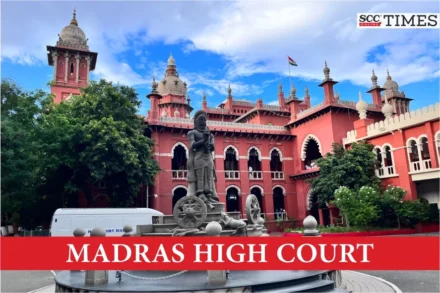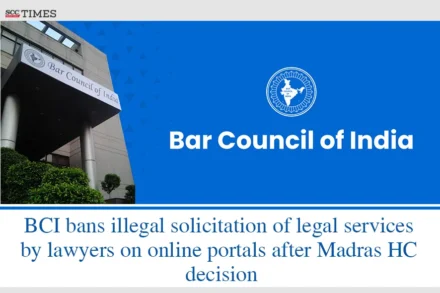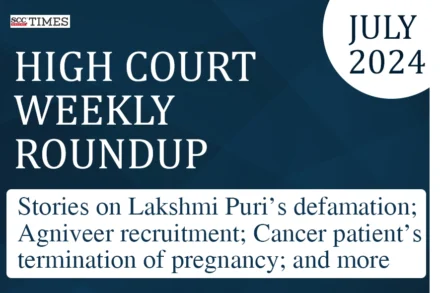
Madras High Court allows burial of BSP Chief K. Armstrong in Pothur Village
K. Armstrong was President of Bahujan Samaj Party over 17 years. He was murdered by Anti- Social rowdy elements on 05-07-2024.

K. Armstrong was President of Bahujan Samaj Party over 17 years. He was murdered by Anti- Social rowdy elements on 05-07-2024.

“The Madras High Cour had remarked that the process of delivery of Justice is strongly based on the Constitution, and lawyers being the upholders of law cannot treat the profession as a business.”

A quick legal roundup to cover important stories from all High Courts this week.

A quick recap of Intellectual Property cases passed by the High Courts in the month of June 2024 along with some top stories on Domino’s, Infosys Trademark Infringement, Patent for Portable Vehicle Management System and much more.

“Once the theory of the prosecution about burning the police jeep is unbelievable, and there is no other evidence on the side of the prosecution to convict the appellants for the offences under Sections 3 or 4 of the TNPPDL Act, the case of the prosecution has to fall in toto”

“Branding culture in the legal profession is detrimental to society. Ranking or providing customer ratings to lawyers is unheard of and demeans the ethos of the profession. Professional dignity and integrity must never be compromised especially in the legal profession.”

“The conclusion that the taxable person is providing a service to the supplier while taking the benefit of a discount by facilitating an increase in the volume of sales of such supplier, is ex facie erroneous and contrary to the fundamental tenets of GST law. Therefore, this conclusion warrants interference, and this issue requires re consideration.”

“The people inhabiting the Kalvarayan hills are from economically and socially backward sections of the Society and their fundamental right to life under Article 21 of the Constitution need to exercised to the fullest.”

“In the event of any unruly behavior of the members of the Bar Association or any unlawful or illegal activities, the Bar Council of Tamil Nadu and Puducherry is bound to initiate appropriate disciplinary action against the Advocates, involving in such activities.”

“When the specific overt act attracting prosecution for criminal offence been made out by the prosecution, if at all the accused wants to plead guilty, it should be done in the manner known to law under Section 482 of CrPC”

“If the Investigating Agency decides not to prefer the appeal against acquitted person, then a person who has interest in the case, which primarily involves misconduct of a public servant who happened to be an elected member in the democratic process, in which, that person is a voter, have a say, and he cannot be deprived of the advantage of perusing the records and arrive at a conclusion.”

“The Court below lost sight of the rudimentary principle governing rape and convicted the convict on the strength of the gospel that Indian women do not lie in such matters, which cannot be sustained, as the facts surrounding each and every case and the evidence available ought to form the basis of arriving at a finding, and the surrounding scenario cannot be the basis to render a finding.”

“A Writ of Mandamus can be issued only if the applicant can show the existence of a legal right.”

“SRM Hotels should have been given an opportunity to demonstrate that they and not TTDC are better equipped to run the hotel.”

“In the post of Typist where there are vacancies at any given time, the petitioner can be accommodated in any subsequent vacancy without the challenge being made to the selection and appointment of the next candidate and without dislodging the candidate who is selected in his place.”

Madras High Court said that the adoptive child is construed to be a member of the adopted family, all the ties of the child are replaced in the adoptive family created by adoption

Madras High Court concluded that without any experimental data to compare the costs of using filtrate material, which requires frequent changing, vis-a-vis using an external reagent, the economic significance of the claimed invention cannot be established. Thus, the claimed invention lacks an inventive step under Section 2(1)(ja) of the Patents Act.

“Sexual harassment causes considerable harm to women. Harassment undermines women’s workplace authority, reduces them to sexual objects and reinforces sexual stereotypes and inappropriate gender behaviour. It can have deleterious consequences for the mental and physical health of women”.

Madras High Court said that the reason given in the impugned refusal check slip reveals the patriarchal mind set of the registering authority, giving an underlying assumption that an unmarried woman above the age of 18 years cannot give her biological child in adoption.

“Why should our future Lawyers be made to undergo the same difficulties we encountered? Why can’t we come together to provide them with a safe and robust ecosystem? This should be the vision we must create for ourselves in today’s time and age”